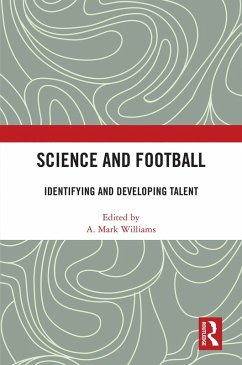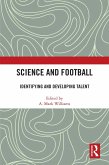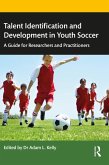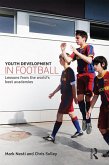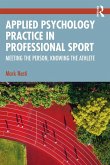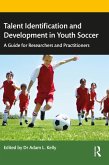Science and Football (eBook, ePUB)
Identifying and Developing Talent
Redaktion: Williams, A. Mark
41,95 €
41,95 €
inkl. MwSt.
Sofort per Download lieferbar

21 °P sammeln
41,95 €
Als Download kaufen

41,95 €
inkl. MwSt.
Sofort per Download lieferbar

21 °P sammeln
Jetzt verschenken
Alle Infos zum eBook verschenken
41,95 €
inkl. MwSt.
Sofort per Download lieferbar
Alle Infos zum eBook verschenken

21 °P sammeln
Science and Football (eBook, ePUB)
Identifying and Developing Talent
Redaktion: Williams, A. Mark
- Format: ePub
- Merkliste
- Auf die Merkliste
- Bewerten Bewerten
- Teilen
- Produkt teilen
- Produkterinnerung
- Produkterinnerung

Bitte loggen Sie sich zunächst in Ihr Kundenkonto ein oder registrieren Sie sich bei
bücher.de, um das eBook-Abo tolino select nutzen zu können.
Hier können Sie sich einloggen
Hier können Sie sich einloggen
Sie sind bereits eingeloggt. Klicken Sie auf 2. tolino select Abo, um fortzufahren.

Bitte loggen Sie sich zunächst in Ihr Kundenkonto ein oder registrieren Sie sich bei bücher.de, um das eBook-Abo tolino select nutzen zu können.
This book presents a state-of-the-art overview of the science underpinning talent identification and development in the world's most popular sport. It covers a broad range of topics that span the various sub-disciplines of sports science with contributions from some of the foremost scientists and applied practitioners globally.
- Geräte: eReader
- mit Kopierschutz
- eBook Hilfe
Andere Kunden interessierten sich auch für
![Science and Football (eBook, PDF) Science and Football (eBook, PDF)]() Science and Football (eBook, PDF)41,95 €
Science and Football (eBook, PDF)41,95 €![Talent Identification and Development in Youth Soccer (eBook, ePUB) Talent Identification and Development in Youth Soccer (eBook, ePUB)]() Talent Identification and Development in Youth Soccer (eBook, ePUB)41,95 €
Talent Identification and Development in Youth Soccer (eBook, ePUB)41,95 €![Elite Soccer Players (eBook, ePUB) Elite Soccer Players (eBook, ePUB)]() Elite Soccer Players (eBook, ePUB)40,95 €
Elite Soccer Players (eBook, ePUB)40,95 €![Youth Development in Football (eBook, ePUB) Youth Development in Football (eBook, ePUB)]() Mark NestiYouth Development in Football (eBook, ePUB)40,95 €
Mark NestiYouth Development in Football (eBook, ePUB)40,95 €![Applied Psychology Practice in Professional Sport (eBook, ePUB) Applied Psychology Practice in Professional Sport (eBook, ePUB)]() Mark NestiApplied Psychology Practice in Professional Sport (eBook, ePUB)34,95 €
Mark NestiApplied Psychology Practice in Professional Sport (eBook, ePUB)34,95 €![Talent Identification and Development in Youth Soccer (eBook, PDF) Talent Identification and Development in Youth Soccer (eBook, PDF)]() Talent Identification and Development in Youth Soccer (eBook, PDF)41,95 €
Talent Identification and Development in Youth Soccer (eBook, PDF)41,95 €![Science and Soccer (eBook, ePUB) Science and Soccer (eBook, ePUB)]() Science and Soccer (eBook, ePUB)53,95 €
Science and Soccer (eBook, ePUB)53,95 €-
-
-
This book presents a state-of-the-art overview of the science underpinning talent identification and development in the world's most popular sport. It covers a broad range of topics that span the various sub-disciplines of sports science with contributions from some of the foremost scientists and applied practitioners globally.
Dieser Download kann aus rechtlichen Gründen nur mit Rechnungsadresse in A, B, BG, CY, CZ, D, DK, EW, E, FIN, F, GR, HR, H, IRL, I, LT, L, LR, M, NL, PL, P, R, S, SLO, SK ausgeliefert werden.
Produktdetails
- Produktdetails
- Verlag: Taylor & Francis eBooks
- Seitenzahl: 302
- Erscheinungstermin: 22. Mai 2023
- Englisch
- ISBN-13: 9781000877786
- Artikelnr.: 67700652
- Verlag: Taylor & Francis eBooks
- Seitenzahl: 302
- Erscheinungstermin: 22. Mai 2023
- Englisch
- ISBN-13: 9781000877786
- Artikelnr.: 67700652
- Herstellerkennzeichnung Die Herstellerinformationen sind derzeit nicht verfügbar.
A. Mark Williams is a highly-cited and world-renowned sports scientist. He is Senior Research Scientist at the Florida Institute of Human and Machine Cognition and a Visiting Professor at several prominent universities in the US and UK. He has published over 300 journal articles and 19 books focusing on the science underpinning how best to identify and develop talent in sport.
Introduction Talent identification and development in soccer: An update and contemporary perspectives 1. Talent identification and development in soccer since the millennium 2. Identifying playing talent in professional football using artificial neural networks 3. Evaluation of soccer players under the Moneyball concept 4. Defining the attributes for specific playing positions in football match-play: A complex systems approach 5. A bioecological perspective on talent identification in junior-elite soccer: A Pan-European perspective 6. A survey of talent identification and development processes in the youth academies of professional soccer clubs from around the world 7. Change-of-direction, speed and jump performance in soccer players: a comparison across different age-categories 8. Maturity status effects on torque and muscle architecture of young soccer players 9. Comparing the magnitude and direction of asymmetry during the squat, countermovement and drop jump tests in elite youth female soccer players 10. A case study comparison of objective and subjective evaluation methods of physical qualities in youth soccer players 11. High-intensity endurance capacity assessment as a tool for talent identification in elite youth female soccer 12. New curve sprint test for soccer players: Reliability and relationship with linear sprint 13. Cross-sectional comparison of body composition and resting metabolic rate in Premier League academy soccer players: Implications for growth and maturation 14. Biomechanical mechanisms of jumping performance in youth elite female soccer players 15. The adolescent motor performance development of elite female soccer players: A study of prognostic relevance for future success in adulthood using multilevel modelling 16. Hill on a mountaintop: A longitudinal and cross-sectional analysis of the relative age effect in competitive youth football 17. Relative age and maturation selection biases in academy football 18. Longitudinal emotional process among adolescent soccer player in intensive training centre 19. Psychological characteristics of developing excellence in elite youth football players in English professional academies 20. Psychosocial outcomes associated with soccer academy involvement: Longitudinal comparisons against aged matched school pupils 21. Positive youth development and gender differences in high performance sport 22. Training load and submaximal heart rate testing throughout a competitive period in a top-level male football team 23. Power training in elite young soccer players: Effects of using loads above or below the optimum power zone 24. Comparative efficacy of active recovery and cold water immersion as post-match recovery interventions in elite youth soccer 25. The developmental and professional activities of female international soccer players from five high-performing nations 26. Evaluating the impact of a coach development intervention for improving coaching practices in junior football (soccer): The MASTER pilot study 27. Efficacy of using non-linear pedagogy to support attacking players individual learning objectives in elite-youth football: A randomised cross-over trial 28. How does the modern football goalkeeper train? An exploration of expert goalkeeper coaches skill training approaches
Introduction Talent identification and development in soccer: An update and contemporary perspectives 1. Talent identification and development in soccer since the millennium 2. Identifying playing talent in professional football using artificial neural networks 3. Evaluation of soccer players under the Moneyball concept 4. Defining the attributes for specific playing positions in football match-play: A complex systems approach 5. A bioecological perspective on talent identification in junior-elite soccer: A Pan-European perspective 6. A survey of talent identification and development processes in the youth academies of professional soccer clubs from around the world 7. Change-of-direction, speed and jump performance in soccer players: a comparison across different age-categories 8. Maturity status effects on torque and muscle architecture of young soccer players 9. Comparing the magnitude and direction of asymmetry during the squat, countermovement and drop jump tests in elite youth female soccer players 10. A case study comparison of objective and subjective evaluation methods of physical qualities in youth soccer players 11. High-intensity endurance capacity assessment as a tool for talent identification in elite youth female soccer 12. New curve sprint test for soccer players: Reliability and relationship with linear sprint 13. Cross-sectional comparison of body composition and resting metabolic rate in Premier League academy soccer players: Implications for growth and maturation 14. Biomechanical mechanisms of jumping performance in youth elite female soccer players 15. The adolescent motor performance development of elite female soccer players: A study of prognostic relevance for future success in adulthood using multilevel modelling 16. Hill on a mountaintop: A longitudinal and cross-sectional analysis of the relative age effect in competitive youth football 17. Relative age and maturation selection biases in academy football 18. Longitudinal emotional process among adolescent soccer player in intensive training centre 19. Psychological characteristics of developing excellence in elite youth football players in English professional academies 20. Psychosocial outcomes associated with soccer academy involvement: Longitudinal comparisons against aged matched school pupils 21. Positive youth development and gender differences in high performance sport 22. Training load and submaximal heart rate testing throughout a competitive period in a top-level male football team 23. Power training in elite young soccer players: Effects of using loads above or below the optimum power zone 24. Comparative efficacy of active recovery and cold water immersion as post-match recovery interventions in elite youth soccer 25. The developmental and professional activities of female international soccer players from five high-performing nations 26. Evaluating the impact of a coach development intervention for improving coaching practices in junior football (soccer): The MASTER pilot study 27. Efficacy of using non-linear pedagogy to support attacking players individual learning objectives in elite-youth football: A randomised cross-over trial 28. How does the modern football goalkeeper train? An exploration of expert goalkeeper coaches skill training approaches
